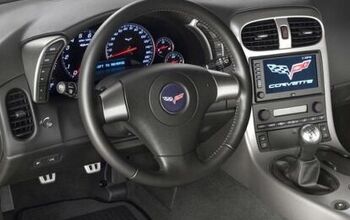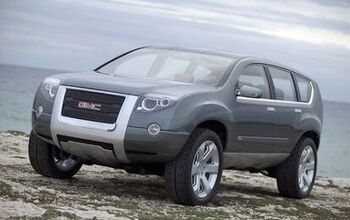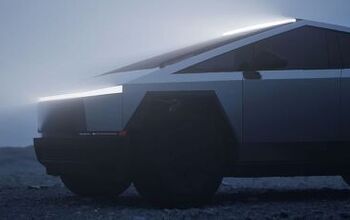General Motors Death Watch 83: The End of Days
Relax. The news that GM stockholder Kirk Kerkorian has been playing footsie with Renault/Nissan doesn’t represent some kind of paradigm shift for GM or global capitalism. When assessing Kirk’s secret plan— selling a minority share in GM to the Franco-Japanese automotive alliance— remember whose interests The Quiet Lion serves: his own. This is not about GM. It’s about Captain Kirk’s spectacularly bad investment in the world’s largest automaker. But don’t take my word for it. "Sometimes the news in itself is already the purpose," DaimlerChrysler's CEO announced upon hearing the news. In other words, multinational automotive conglomerator Dieter Zetsche thinks Kerkorian is just talking up GM’s stock price.
Lest we forget, the octogenarian investor has lost about a billion dollars since he started buying up GM stock. (I don’t care how many billions you’ve got stashed in Swiss bank accounts and offshore trusts, one less thousand million has GOT to hurt.) Anyway, mission accomplished. Despite the fact that GM-friendly Wall Street analysts have just celebrated GM getting smaller, the investment community is, let’s face it, a size queen. The news that Captain Kirk has been busy whoring GM to dubious foreigner carmakers— I mean discussing the possibility of GM entering into a mutually beneficial strategic alliance– sent GM’s stock price soaring. On Friday (always a good day to hit the market with a surprise), GM shares closed at $29.79 up $2.35.
On the other hand, if Wall Street catches wind that Kerkorian is unloading a chunk of his 9.9% GM shareholding, the company’s stock price will swan dive. So it’s not entirely impossible that Kirk’s play is what it seems: an attempt to save GM’s bacon. And yet, on the face of it, a GM – Renault/Nissan hook-up makes no sense. Even The Detroit News’ resident optimist sees no benefits to the deal. “GM has spent the past 15 years pushing to achieve what the megadeal would purport to achieve," Daniel Howes wrote yesterday. "Economies of scale in purchasing, common manufacturing and product development processes, global leadership in developing world markets. These megadeals seldom — if ever — deliver the ‘synergies’ their highly paid outside architects say they will.”
Of course, there is one important benefit to Captain Kirk’s bold moves: cash. If you take a close look at what’s been proposed, Kirk wants Nissan/Renault to partner up, then “seal the alliance” by buying 20% of GM’s common stock for $3b. Three billion dollars doesn’t seem like a lot of money in the GM scheme of things. It’s almost a billion less than GM CEO Rabid Rick Wagoner recently spent paying 37k union workers not to work. But it’s not chump change either— especially when you consider the fact that GM is running on fumes. Remember the extension of GM’s accounts payable and the new secured line of credit? Cerberus does.
The [fire] sale of The General’s GMAC finance unit to Cerberus Capital Management is the last bit of family silver The General has left to flog. And it’s only two credit downgrades away from implosion. Without GMAC cash, the show’s over. In fact, it may already be too late. GM’s vehicle sales are in the doldrums, there’s no Hail Mary in the pipeline, market share (dealer income) has gone south and a bunch of humongous downsizing bills are coming due. Not to mention the possibility of an August strike at GM’s mission critical ex-subsidiary, bankrupt parts supplier Delphi (yes that). Avoiding Delphi's cyanide pill may require another billion or so from GM’s threadbare corporate pockets.
If you doubt that GM could be so cash-starved that The Quiet Lion would be allowed to sell the company’s soul to Renault/Nissan, consider this. TTAC commentator Finance Guy recently alerted us that GM is offering its zero percent new car financing deal to anyone with a pulse. More specifically, FG has resurrected 10 dead deals. No wonder: GMAC will now buy down on credit tiers A to E (prime to non-prime buyers). Cutoff is around a 590 FICO. Typically people in that range can’t get a new car without a substantial down payment. Obviously, GM is opening the floodgates. There’s one word for that: Mitsubishi. The Japanese carmaker’s US fortunes foundered on the rocks of easy credit, as hundreds of thousands of come-on-down loans blew up in their face.
In short, the idea that GM would contemplate joining a Renault/Nissan “alliance” is a sign of the General’s desperation, not its ability to seize an international opportunity (whither Fuji, Fiat and Suzuki). Viewed from another angle, depending on what the Franco-Japanese contingent want for their money, you might even say that GM’s breakup has already begun. In any case, it’s yet another one of the bizarre episodes we’ve been predicting for some time: the end of days at GM.
More by Robert Farago
Latest Car Reviews
Read moreLatest Product Reviews
Read moreRecent Comments
- Jalop1991 In a manner similar to PHEV being the correct answer, I declare RPVs to be the correct answer here.We're doing it with certain aircraft; why not with cars on the ground, using hardware and tools like Telsa's "FSD" or GM's "SuperCruise" as the base?Take the local Uber driver out of the car, and put him in a professional centralized environment from where he drives me around. The system and the individual car can have awareness as well as gates, but he's responsible for the driving.Put the tech into my car, and let me buy it as needed. I need someone else to drive me home; hit the button and voila, I've hired a driver for the moment. I don't want to drive 11 hours to my vacation spot; hire the remote pilot for that. When I get there, I have my car and he's still at his normal location, piloting cars for other people.The system would allow for driver rest period, like what's required for truckers, so I might end up with multiple people driving me to the coast. I don't care. And they don't have to be physically with me, therefore they can be way cheaper.Charge taxi-type per-mile rates. For long drives, offer per-trip rates. Offer subscriptions, including miles/hours. Whatever.(And for grins, dress the remote pilots all as Johnnie.)Start this out with big rigs. Take the trucker away from the long haul driving, and let him be there for emergencies and the short haul parts of the trip.And in a manner similar to PHEVs being discredited, I fully expect to be razzed for this brilliant idea (not unlike how Alan Kay wasn't recognized until many many years later for his Dynabook vision).
- B-BodyBuick84 Not afraid of AV's as I highly doubt they will ever be %100 viable for our roads. Stop-and-go downtown city or rush hour highway traffic? I can see that, but otherwise there's simply too many variables. Bad weather conditions, faded road lines or markings, reflective surfaces with glare, etc. There's also the issue of cultural norms. About a decade ago there was actually an online test called 'The Morality Machine' one could do online where you were in control of an AV and choose what action to take when a crash was inevitable. I think something like 2.5 million people across the world participated? For example, do you hit and most likely kill the elderly couple strolling across the crosswalk or crash the vehicle into a cement barrier and almost certainly cause the death of the vehicle occupants? What if it's a parent and child? In N. America 98% of people choose to hit the elderly couple and save themselves while in Asia, the exact opposite happened where 98% choose to hit the parent and child. Why? Cultural differences. Asia puts a lot of emphasis on respecting their elderly while N. America has a culture of 'save/ protect the children'. Are these AV's going to respect that culture? Is a VW Jetta or Buick Envision AV going to have different programming depending on whether it's sold in Canada or Taiwan? how's that going to effect legislation and legal battles when a crash inevitibly does happen? These are the true barriers to mass AV adoption, and in the 10 years since that test came out, there has been zero answers or progress on this matter. So no, I'm not afraid of AV's simply because with the exception of a few specific situations, most avenues are going to prove to be a dead-end for automakers.
- Mike Bradley Autonomous cars were developed in Silicon Valley. For new products there, the standard business plan is to put a barely-functioning product on the market right away and wait for the early-adopter customers to find the flaws. That's exactly what's happened. Detroit's plan is pretty much the opposite, but Detroit isn't developing this product. That's why dealers, for instance, haven't been trained in the cars.
- Dartman https://apnews.com/article/artificial-intelligence-fighter-jets-air-force-6a1100c96a73ca9b7f41cbd6a2753fdaAutonomous/Ai is here now. The question is implementation and acceptance.
- FreedMike If Dodge were smart - and I don't think they are - they'd spend their money refreshing and reworking the Durango (which I think is entering model year 3,221), versus going down the same "stuff 'em full of motor and give 'em cool new paint options" path. That's the approach they used with the Charger and Challenger, and both those models are dead. The Durango is still a strong product in a strong market; why not keep it fresher?


































Comments
Join the conversation
ktm, The average age of a first time home buyer is 32. So you're paying off your house at 82! Umm, I don't plan on working in my 70's, much less 82. I don't think I'll be living into my 70's, but that's besides the point. But, yes it gives those unable to buy a chance. Yes, you can refi. But you're paying interest for an extra 20 years! From: http://www.bankrate.com/brm/news/mortgages/20060427a1.asp "But just for grins, let's compare a 30-year fixed-rate loan with a mythical 50-year fixed. For a 30-year loan of $300,000 at 6.5 percent, principal and interest cost $1,896.20 per month. A 50-year loan for the same amount and at the same rate costs $1,691.15 per month in principal and interest. The 50-year loan costs $205 less per month, but the payments stretch out for 20 years longer and will cost a total of $332,058 more." Ouch.
Robert: while I agree with much of what you write, this line doesn't make sense: "Of course, there is one important benefit to Captain Kirk’s bold moves: cash". If Renault-Nissan buy 20% of GM, the money doesn't go to GM, it goes to the stock-holder that sells them their stock. Just like when Captain Kirk bought his 10%, GM didn't get his cash, just the thorn in the side. With 20% more on his side the thorn would be that much bigger! The deal doesn't make any sense but Kirk has had Wagoner on the run all year. Its like watching a chess match and Kirk just said "check-mate". We'll see if Wagoner has any moves left.